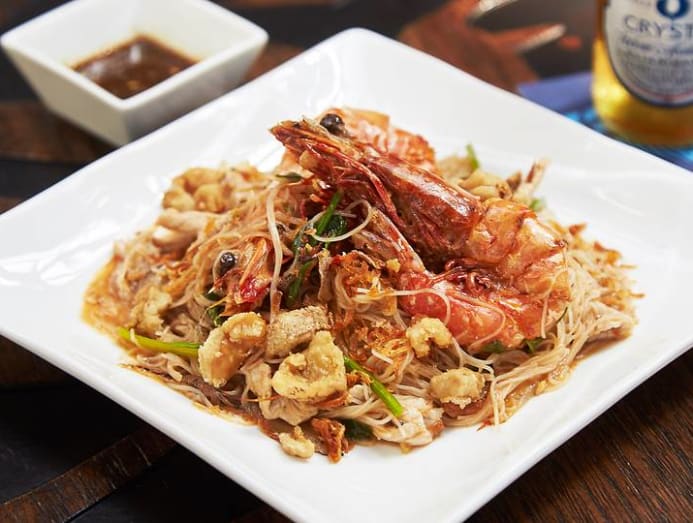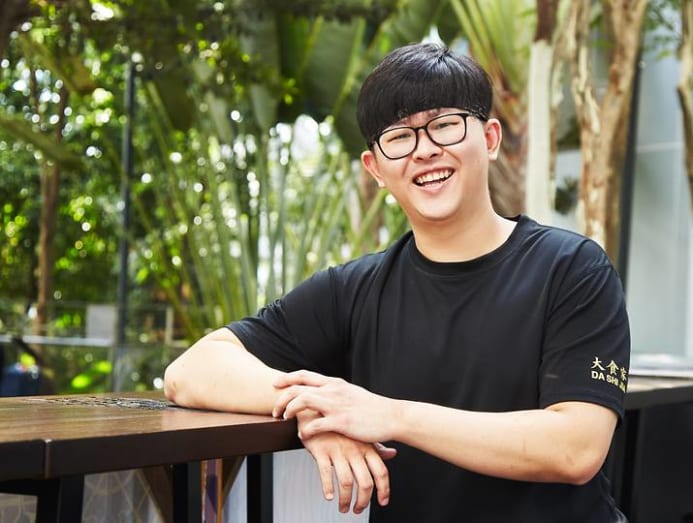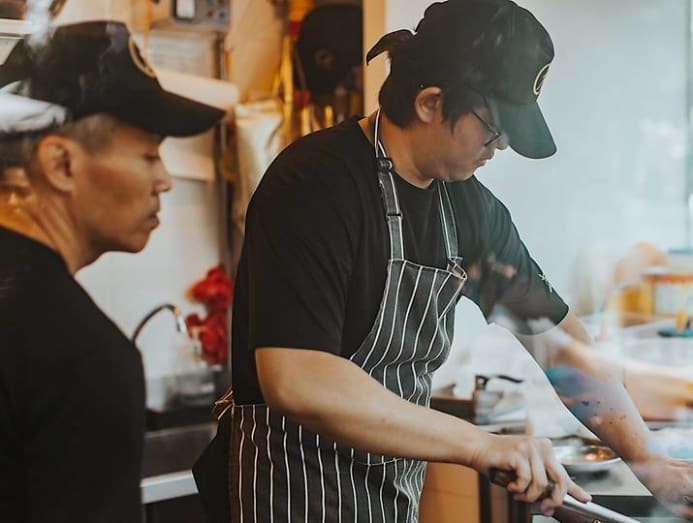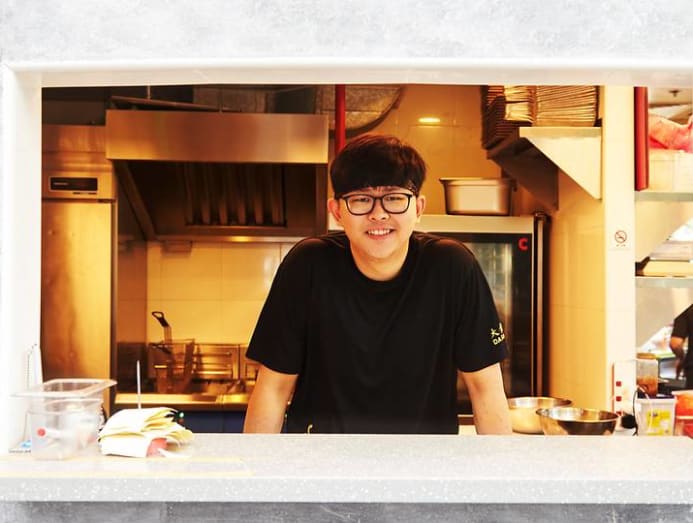Everyone loves his prawn noodles, but this street food chef waits for dad’s praise
Building on his family’s zi char business, Da Shi Jia’s Seth Sim found a new and successful niche, but he has ‘no idea’ if his father is proud of him.

Seth Sim of Da Shi Jia, which is currently serving up its signature wok-fried white bee hoon at Tiger Street Lab. (Photo: Kelvin Chia)
At 30 years old, Seth Sim is a successful second-generation F&B business owner who followed in the footsteps of his zi char specialist father.
His Da Shi Jia prawn noodle eatery at Killiney Road generated significant social media hype when it opened two years ago, with pictures of its stunning Wok Fried Big Prawn White Bee Hoon dish setting foodies abuzz; and, riding the wave of its success, it is now the star attraction of Tiger Street Lab at Jewel Changi Airport, where visitors can enjoy Sim’s dishes for a limited time.

Through a combination of business savvy, knowledge and experience gleaned throughout his growing-up years – his father has owned zi char concepts including Master Crab and Big Eater Seafood Restaurant – Sim has cleverly managed to move the traditional dish of prawn noodles into a new age.
But for all his triumphs, he says he has “no idea” if his father is proud of him.
“My dad doesn’t praise me. He’s never given me any leniency. He still pinpoints the mini mistakes that I make,” Sim said with a wry smile.
I’ve never once received a ‘You’ve done a good job’ on anything. He’ll say things like, ‘You need to improve on this and that.’
“Up until now, with the results (produced), I’ve never once received a ‘You’ve done a good job’ on anything. He’ll say things like, ‘You need to improve on this and that.’ He never really criticises me, but he points out mistakes and wants me to solve them.”
This is the way of the Asian father, who prefers to show his love by wanting his child to be the best he can be, as those of us who grew up in conventional Chinese families would know.
“He’s a very traditional Chinese dad. He will try to perfect me in every way,” Sim said. “It’s” – he paused – “challenging! It’s a bit tough. But, I just need to do what I have to do.”
READ: The Singaporean chef-turned-hawker creating a food empire built on lor bak
Even now, with Sim running two Da Shi Jia outlets, his father regularly drops in “to audit me”, he quipped, and even checks to see if guests clean their plates or leave food untouched.
But it is love for his father that motivates Sim in the business. “I think my dad has had a very tough life over the years. He probably has gone for only two holidays in his life, and even then, he took them as business trips, to look at other products. So he’s never used them to enjoy himself. I thought I should shoulder some responsibilities so that he can take a step back and retire,” he said.
FOOD, FAMILY, LEGACY

Sim has accepted that his life now is the same – his day begins at 11am and ends at 5am, leaving hardly any time even for sleep, much less recreation or any sort of social life.
Because of his hectic schedule, he shared, his wife of two years initially suspected him of cheating. “At the start, she didn’t really believe that a guy who was running his own business would have no time for her. I didn’t have time to answer her calls so there were a lot of missed calls. She suspected I was going out with another girl. I said, ‘If you really don’t believe me, come and help me out on the weekends and you can see for yourself.’”
READ: ‘This kind of place sure cannot last’: Artichoke's Bjorn Shen laughs at critics 9 years on
Sim himself is used to the grind – even as a child, he helped out at his family’s eateries for extra pocket money. “My daily cycle would be work, then go to school to sleep, then play video games. You would see me falling asleep in class most of the time. Most of the time, I failed my classes. I told my parents I didn’t like studying.” Happily for him, “My dad understood that not everyone needs to study to make it in life. His own education was only up until secondary school.”
After completing Secondary Four, Sim did his National Service, then joined the family business, helping his dad with logistics and administration. Subsequently, he obtained a private diploma in business management. “After understanding the world of business, I went to culinary school to learn more about equipment and what I could tap on to reduce the manpower required,” he said.

He recognised a golden opportunity when one of his father’s friends, a Boon Lay prawn noodle hawker, decided he wanted to retire. Sim spent a gruelling year and a half mastering the art of making prawn noodles from the man he calls his “shifu”.
“I would go to the stall at 2am and learn how to cook everything from scratch, from frying the prawns and scallops to making the chilli, until about 11am or 12pm, when the noodles would sell out. I’d go home to rest until about 4pm. Then, I’d go back to my dad’s restaurant to help out because of the lack of manpower there. I’d cook all the way until 10pm, then go home to rest again until 1am, when I would have to get ready for the next day,” he recalled.
“Shifu wanted to pass the hawker shop to me when he retired, but I dared not take it up because his reputation had been there for years. I was afraid that a very minor mistake would disappoint him. Sometimes the smallest things make the customer feel different.”
When Sim’s father sold his zi char eatery in Simei and relocated to Killiney Road, it was clear that the new space was not large enough for a zi char restaurant, which requires about 13 cooks in the kitchen, Sim said. So, it was the perfect opportunity to start a prawn noodle restaurant – and his business sense kicked in strongly.
“My shifu sold a bowl of noodles for S$3.50. It was very affordable. But if I serve noodles in a nicer setting, I can make them a little bit pricier – I just need to improve on some of the ingredients,” he reasoned.
And aside from knowing that staying small-scale was important for optimising resources, Sim understood the power of offering consumers choices.
“If I were to sell, let’s say, chicken rice – there’s no way for me to mark up chicken rice to a perfect spending of, say, S$15 or S$18 dollars.” But with prawn noodles, “I can use the size of the prawn to (justify) a difference in the price. So, I can sell dishes from S$5.80 – my lowest price – all the way to S$16.80.”
I would like to keep it as traditional as possible but I need to tweak the menu because our generation likes to always have something new.
It’s a notable strategy for helping to not only preserve local street food culture, but also move it into the future.
“I would like to keep it as traditional as possible because that’s the culture I was brought up in, but I need to tweak the menu because I believe that our generation likes to always have something new, and I need to attract them in order to stay in the business market,” he said. His approach has been to “give the customer a very traditional menu, and maybe create one or two modified items to attract more customers.”
PRAWN THIS WAY
It’s worked well, as the Wok Fried Big Prawn White Bee Hoon, priced at S$16.80, is undoubtedly the establishment’s star dish. It’s also the most ordered dish at Tiger Street Lab, where hungry customers can have their pick of food stalls.
It’s an umami-laden dish that Sim developed by fusing prawn broth with the zi char techniques he learned from his father. And even disregarding the enormous prawns that go into it, it costs more than your average noodle dish because it takes skill, effort and training to prepare.
“It takes less than a minute to prep a regular bowl of prawn noodles. But for this dish, we need to caramelise the garlic and onion; fry the bee hoon to get the char or wok hei; fry the prawns, taking care that if you cook them 100 per cent, the meat will be tough; simmer the bee hoon so the sauce becomes creamy; and cook the prawns further to get the flavour.”
When the dish was first trialled, it was his grandparents’ approval that counted the most. “That was the first time I cooked for my grandparents. They ate, they were happy, they finished the food. That was the time that made me the happiest,” he shared.

“I like to cook for others but not for myself. No matter how hungry I am at night, I’d rather eat biscuits than cook. No chef would want to cook and eat,” he said. “I like to watch people enjoying their food, or, if they feel something is off, I like to understand why.”
It’s clear that family and serving others comes first for Sim, even as he runs a thriving business and is working on another local food concept, the details of which he can’t share just yet.
On the bright side – although he facetiously argues otherwise – Da Shi Jia is doing so well that his wife was able to leave her banking job to become “an overly paid waitress”. “She gets to fill in her own salary, which I have to pay her,” he quipped.
This means that at least the couple get to spend time together in the midst of their busy-ness. Still, “Her number one question up until now is, ‘When is our honeymoon?’”





